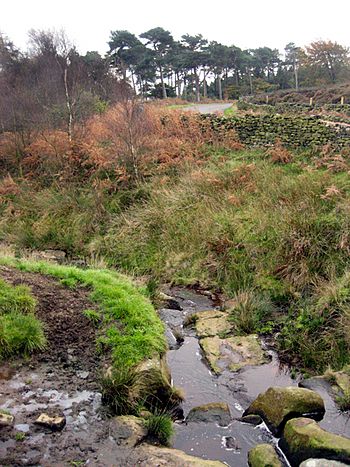River Hipper facts for kids
Quick facts for kids River Hipper |
|
|---|---|

At this point the Hipper comes off Beeley Moor and flows towards Holymoorside, becoming the river Hipper on the way
|
|
| Country | England |
| Physical characteristics | |
| Main source | Beeley Moor |
| River mouth | River Rother |
The River Hipper is a river in Derbyshire, England. It's like a smaller stream that flows into a bigger river called the River Rother. It starts on Beeley Moor, which is part of the famous Chatsworth Estate. It begins in a wet, marshy area called the Hipper Sick, where water collects from the nearby moors.
The river then flows through a village called Holymoorside and into the town of Chesterfield. Just south of Chesterfield town centre, the River Hipper joins the River Rother. In July 2007, there was a very big storm, and the River Hipper overflowed its banks. This caused parts of Chesterfield to flood.
Contents
About the River Hipper's Water Quality
The Environment Agency is a group in England that checks how clean and healthy rivers are. They give each river system an overall "ecological status." This status can be one of five levels: high, good, moderate, poor, or bad.
How Water Quality is Measured
To figure out a river's health, experts look at a few things:
- Biological status: This checks the types and numbers of living things in the water. They look at tiny creatures called invertebrates, flowering plants, and fish.
- Chemical status: This checks for different chemicals in the water. They compare the amount of chemicals found to safe levels. The chemical status is either "good" or "fail."
However, a study by the Wild Trout Trust found some issues with the River Hipper. The river has several small dams, called weirs, that block its flow. Also, parts of the river channel have been made straight.
Why Weirs and Straight Channels Matter
- Weirs: These small dams stop fish from moving freely between different parts of the river. This can make it hard for fish populations to mix and stay healthy.
- Straight Channels: Rivers that are straightened lose their natural curves and varied depths. This means there are fewer different places for wildlife to live, which reduces the variety of animals and plants that can thrive there.
River Hipper's Water Quality in 2015
Here's how the River Hipper's water quality was rated in 2015:
| Section | Ecological Status | Chemical Status | Overall Status |
|---|---|---|---|
| Hipper from Source to River Rother | Moderate | Good | Moderate |
 | Percy Lavon Julian |
 | Katherine Johnson |
 | George Washington Carver |
 | Annie Easley |

